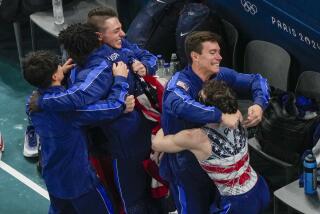NOTEBOOK : He Enjoys Only Spirit of Comeback Award
- Share via
UCLA volleyball player Brian Boone learned he was $5,000 richer but couldn’t keep the money. Boone, 21, of Huntington Beach, won a comeback award along with team handball player Liv Ellen Halle, 23, of Colorado Springs, Colo., and their trainers.
Boone, a junior at UCLA, won’t accept the money because he still has a year of NCAA eligibility remaining.
“This is a real surprise,” Boone said. “I didn’t even know I was nominated until last week.”
Boone underwent knee surgery for acute tendinitis, and calcium deposits were found in his ligament.
Halle worked out six hours a day in rehabilitation after surgery to repair the anterior cruciate ligament she tore in her left knee. The Norwegian-born 23-year-old was back playing team handball five months after the surgery.
Also receiving $5,000 were Dale Rudd, Boone’s trainer, and Ed Ryan, Halle’s trainer.
Arizona State’s Bobby Douglas, who was named coach of the U.S. Olympic wrestling team for the Barcelona Games, will be the first black to coach an American wrestling team in the Olympics, but breaking new ground isn’t really new to him. In 1963, Douglas was the first black American wrestler to compete in freestyle at the World Championships.
Raised by his grandparents in rural Ohio, Douglas spent summers with an aunt in Chicago. “I got to see both sides of the coin,” he said. “I got street-wise and still learned how to hunt and fish.”
In what looks like a reluctant partnership, the U.S. men’s and women’s field hockey associations are getting together in something resembling less than total bliss. The U.S. Olympic Committee has decreed that the 1,700-member Field Hockey Assn. of America, the men’s group, must merge with the stronger 15,000-member United States Field Hockey Assn., the women’s group.
The USOC reasoning is that financial demands and marketing pressures have forced the merger, plus the fact that the field hockey groups are the last Olympic-class sports bodies to be gender-based. But the women’s group is especially wary of the merger.
“A lot of the women in our organization . . . remember what happened when the NCAA took over the women’s collegiate body,” said USFHA Executive Director Carolyn Moody. “The women’s sports suffered. That’s one of the biggest fears of our women.”
On June 27, two weeks before the Festival opened, officials from 10 of the 36 sports had not submitted rosters. On the eve of last Friday’s opening ceremony, U.S. Olympic Committee officials were still waiting for lists of competitors in two sports.
But USOC spokesman Mike Moran said that is not particularly unusual for a Festival.
“On the way to the stadium for the opening ceremony in Oklahoma City in 1989, some of the women from one of the team handball teams spotted a woman playing basketball at an outdoor hoop,” he said. “Since they were missing one player from their team because of an injury, they told the bus driver to pull over. They recruited the woman right on the spot to play in the Festival.
“She had never played team handball before but she turned out to be pretty good.”
More to Read
Go beyond the scoreboard
Get the latest on L.A.'s teams in the daily Sports Report newsletter.
You may occasionally receive promotional content from the Los Angeles Times.






